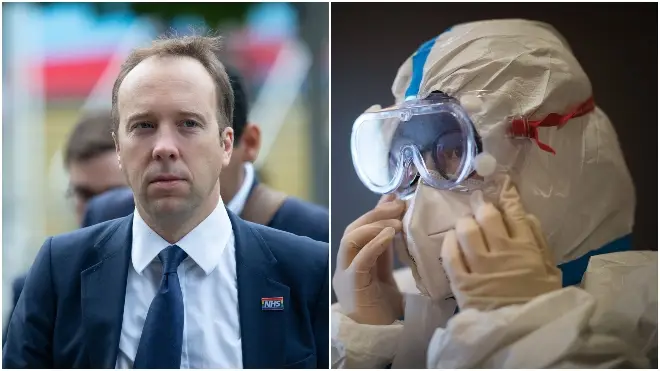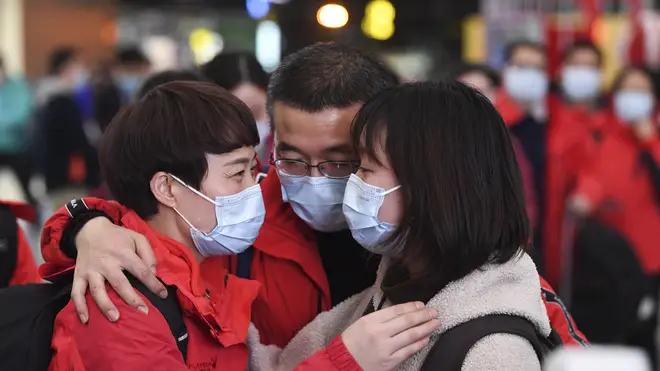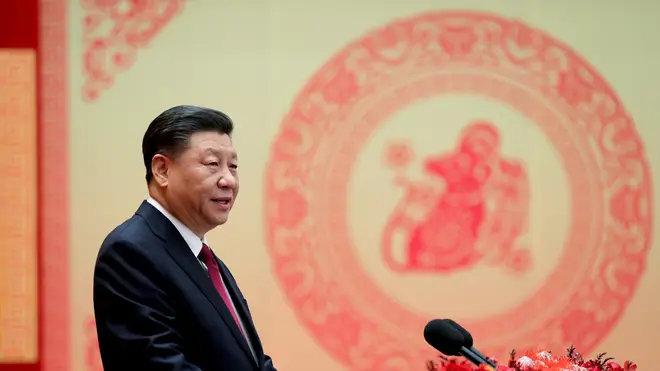
Ben Kentish 10pm - 1am
27 January 2020, 18:06

Health Secretary Matt Hancock has said people returning to the UK from coronavirus-hit Wuhan in China should "self-isolate".
The minister recommended the measure while speaking to MPs in the House of Commons on Monday.
He added that people should "stay indoors and avoid contact with other people" for 14 days, even if they have no symptoms.
Mr Hancock said health officials were unsure whether people showing no signs of the disease could still manage to spread the virus.
Time-lapse footage captures progress made building Wuhan's first coronavirus hospital
This move sees the UK significantly ramping up its precautions, with more than 50 people in the country having been tested for the illness, but all returning negative.
The death toll since the outbreak of the virus has reached 80, with the total number infected now standing at 2,744.

Roughly 1,500 people have returned to the UK from Wuhan since 10 January, meaning all would need to isolate themselves for two weeks following the health secretary's advice.
The Foreign Office is working to get British nationals out of Hubei province, where Wuhan lies, with Prime Minister Boris Johnson saying his government are doing "everything we can" to help their return.
There are an estimated 200 UK citizens currently in the coronavirus-hit region that wish to return home.
Mr Hancock's advice to "self-isolate" would also be relevant to these people.
He reassured MPs that Public Health England had set up a hub at Heathrow Airport to meet all flights from China.
He told MPs: "Coronaviruses do not usually spread if people don't have symptoms - but we cannot be 100 per cent certain.
"From today, we are therefore asking anyone in the UK who has returned from Wuhan in the last 14 days to self-isolate.
"Stay indoors and avoid contact with other people - and to contact NHS 111. If you are in Northern Ireland, you should phone your GP.
"If you develop respiratory symptoms within 14 days of travel to the area, and are now in the UK, call your GP or ring 111 informing them of your symptoms and your recent travel to the city.
"Do not leave your home until you have been given advice by a clinician."

He also advised anyone in Hubei province who wished to return home to get in touch with the UK Foreign Office.
When asked by shadow health secretary John Ashworth whether there were sufficient specialist beds available in the NHS, he replied saying the service was "ready."
"There are four centres that are stood up and ready should there be a need," he said.
"The centres are in St Guys and Thomas' Hospital (London), Liverpool, Newcastle and the Royal Free (London) and there is a further escalation if more beds are needed.
"So we are ready, but of course we keep all these things under review."
Public Health England medical director Dr Yvonne Doyle told Sky News she suspects there are already cases of the virus in the UK, but believes the country is "well-prepared."
It also emerged today that Mongolia has closed its 3,000-mile border with China until 2 March to prevent the disease from spreading.
Chinese President Xi Jinping has said that the government is stepping up efforts to restrict travel and public gatherings while rushing medical staff and supplies to the city at the centre of the crisis, Wuhan, which remains on lockdown.
Five cases have been reported in Hong Kong and Macau, with other cases reported across the globe.
The virus has been found in Thailand, Taiwan, Japan, South Korea, the US, Vietnam, Singapore, Malaysia, Nepal, France, Canada and Australia.